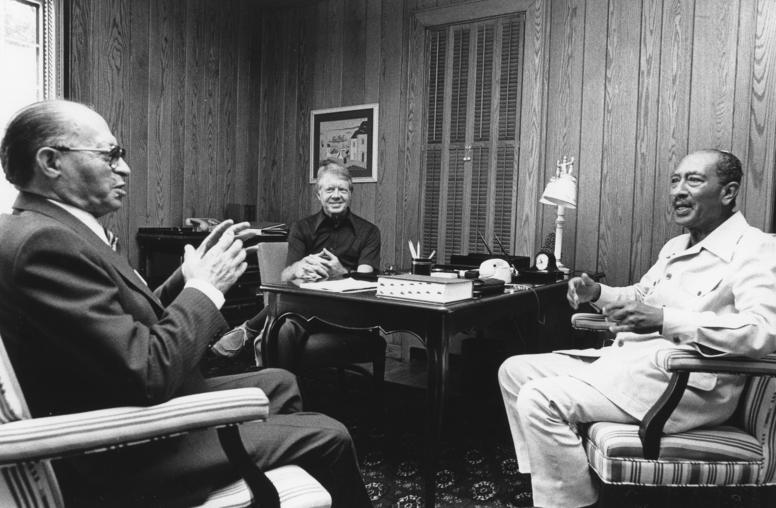Q&A Egypt’s Post-Referendum Mood
On the Issues with Manal Oman
Egyptians went to the polls on Jan. 14-15 to vote on a new constitution, the third referendum on a charter since the spring 2011 uprising that ultimately toppled authoritarian President Hosni Mubarak. Manal Omar, USIP’s associate vice president for the Middle East and Africa, has been on the ground in Cairo and discusses the significance of the vote, the issues involved, and the prospects for Egypt’s political system going forward.

For Omar’s reflections on the referendum, see her analysis on the website of Foreign Policy magazine.
Q. What was at stake in this referendum?
A. The result of the Jan. 14-15 vote was intended to gauge public support for a document drafted by a commission appointed by the interim President Adly Mansour after President Mohammed Morsi was ousted from power last July. The charter would replace one crafted under the Morsi administration, which critics said was too biased in favor of Islamists, to the exclusion of others. Results likely show overwhelming support for the constitution, but the outcome may reflect less a verdict on the contents of the document and more the desire of Egyptians to move forward toward a government that can ensure their physical and economic security.
Q. What has been the mood and reaction of the Egyptian public during and since the referendum?
A. The Egyptian public overall continues to appear strongly in favor of a “yes” vote approving the proposed constitution. The primary mood has been one of celebration and eagerness to move forward with the next stage for Egypt. This is particularly true for people and businesses involved in tourism, which many media outlets have depicted as being among the primary victims of the instability. There was a general question about overall security during the voting, but people seem to feel that volatile incidents were kept to a minimum. There was a little more tension on the second day of the referendum, and in the afternoon there were many rumors that Muslim Brotherhood supporters were heading to the squares for demonstrations. But there was still a high level of confidence that the military and police would maintain full control.
Q. What are the most striking scenes you’ve witnessed in Cairo around the referendum?
A. The majority of my time in Cairo was in general public places, and what struck me the most was the routine – people going on with their daily lives with little signs of the chaos or unrest that we have seen in the last couple of years. When driving by polling stations, the lines of voters were of average length, and there was little sign of any mass mobilization. However, from taxi drivers to waiters in café’s to business owners, the red ink-stained fingers indicating they had cast their votes were common around the city.
Q. What are the next steps after the results are announced?
A. The interim government, installed by the military that overthrew Morsi after renewed public demonstrations against his rule, is following its roadmap for a transition to a new permanent government, starting with the new constitution. There is still a lot of discussion on what the next step would be – whether the referendum will be followed by the planned parliamentary election and a vote for a new president this year. General Abdul Fattah al-Sisi, the Egyptian military chief, has indicated that he would see approval of the constitution as a kind of endorsement for his potential candidacy for president, and public expressions of support for him suggest he probably would win. The primary candidates for president have all indicated if al-Sisi decides to run, they would withdraw their candidacy and endorse his campaign instead.
Q. What kinds of power and authority does the new constitution give the military, nongovernmental organizations and individuals, and what issues does that raise?
A. The new constitution is seen as an improvement over the 2012 constitution under Morsi because the revision builds in more freedoms and guarantees certain rights. This is particularly true for equality of men and women, and for freedom of religion. The charter also provides a stronger role for the parliament, giving some clear checks and balances vis-a-vis the position of the president. The primary criticisms are that it secures the authority of the military, and that many of the freedoms guaranteed might, in the end, not be enshrined in legislation.
Individuals representing political Islamists were notably absent from the drafting committee, with the exception of Mohammed Mansour of the Salafist Nour Party, which sided with the military in ousting Morsi. The Muslim Brotherhood and its associated Freedom and Justice Party (FJP) opposed the new constitution and boycotted the referendum. Other groups that opposed the new constitution include: Strong Egypt Party, the April 6 Youth Movement, the Revolutionary Socialists, and the No to Military Trials group.
Q. Considering the military-backed government's actions against opponents, what are the prospects for Egypt to develop any kind of robust civil society and civilian-controlled government?
A. There is a general belief that the government’s current actions are intended primarily to protect the country's stability and promote much-desired security. The fact that this has been promoted as a crackdown on terror has allowed many Egyptians to believe that there will indeed be room to develop a civilian-led government in the long term, along with maintaining an active civil society. Egypt already has a robust civil society, with some of the best human rights, women's rights, and development organizations in the region. There are still challenges, moving forward, but many civic leaders are pushing for incremental change, which they think carries less risk of jeopardizing stability, rather than reforms prompted by mass revolutionary movements.



